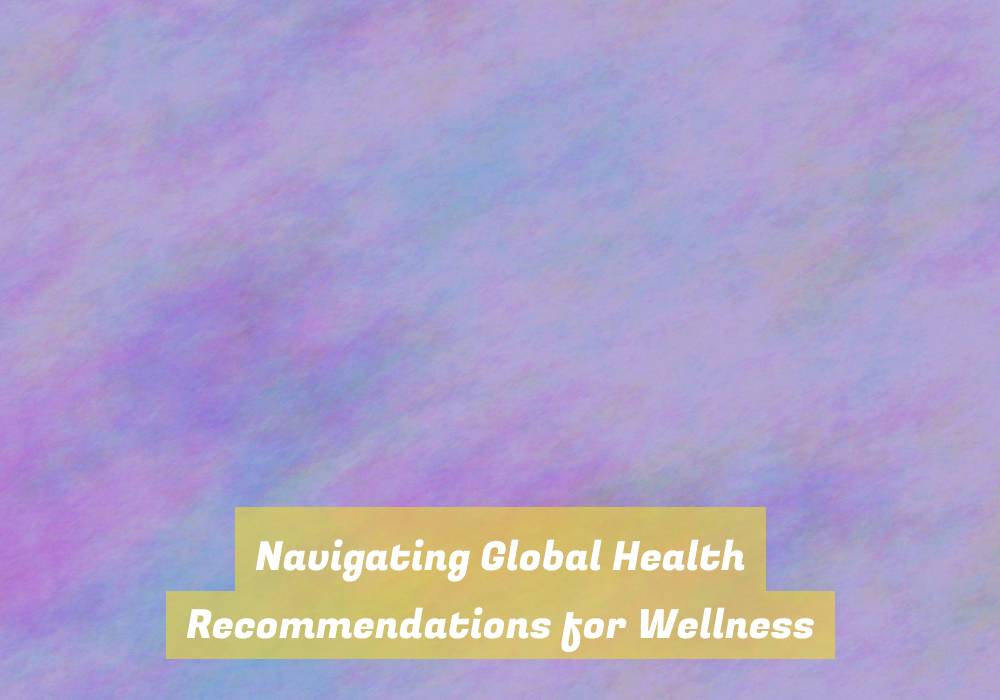Navigating Global Health Recommendations for Wellness
As you embark on your journey to navigate the ever-evolving landscape of global health recommendations for wellness, itG??s crucial to decipher the plethora of information available at your fingertips. With a multitude of sources and varying perspectives, understanding the best strategies for your overall well-being can be a daunting task.
However, by critically evaluating the guidance provided and implementing best practices, you can ensure that you are equipped with the knowledge and tools necessary to make informed decisions.
Understanding Global Health Guidelines
Understanding the global health guidelines is essential for maintaining wellness and making informed decisions about your health. By staying informed about the latest recommendations from global health organizations, such as the World Health Organization (WHO) and the Centers for Disease Control and Prevention (CDC), you can take proactive steps to protect yourself and your loved ones. These guidelines cover a wide range of topics, including vaccinations, disease prevention, nutrition, and mental health.
One of the key aspects of understanding global health guidelines is recognizing the importance of preventive care. Regular vaccinations, screenings, and check-ups can help detect potential health issues early on, increasing the chances of successful treatment. Additionally, being aware of travel advisories and disease outbreaks in different parts of the world can help you make informed decisions about your travel plans and take necessary precautions.
Moreover, global health guidelines provide valuable insights into maintaining a healthy lifestyle. These recommendations often emphasize the importance of a balanced diet, regular exercise, and adequate sleep for overall well-being. By incorporating these guidelines into your daily routine, you can proactively promote your own wellness and reduce the risk of chronic diseases.
Evaluating Wellness Strategies
To effectively assess wellness strategies, consider their impact on your overall health and daily life. Start by evaluating whether a particular strategy aligns with your personal wellness goals and values. Reflect on how the strategy may affect your physical, mental, and emotional well-being.
Consider the practicality of integrating the strategy into your daily routine and how it may fit within your lifestyle. Assess whether the strategy promotes sustainable habits that contribute to long-term wellness, rather than offering short-term solutions. Look for evidence-based information and credible sources to support the effectiveness of the strategy.
Additionally, seek feedback from reliable sources, such as healthcare professionals or trusted individuals whoG??ve experience with the wellness strategy. Keep in mind that wellness is a holistic concept, so consider how the strategy influences various aspects of your life, including relationships, work, and leisure activities.
Implementing Best Practices
Consider incorporating evidence-based wellness strategies into your daily routine to promote long-term health and well-being.
Start by prioritizing regular physical activity. Aim for at least 150 minutes of moderate-intensity exercise per week, such as brisk walking, swimming, or cycling. Additionally, integrating strength training exercises into your routine at least twice a week can help improve muscle strength and endurance, further contributing to your overall well-being.
Incorporating a balanced and nutritious diet is crucial. Focus on consuming a variety of fruits, vegetables, whole grains, lean proteins, and healthy fats. Minimize processed foods, sugary drinks, and excessive sodium intake. Hydration is also key, so ensure that youG??re drinking an adequate amount of water throughout the day.
Moreover, prioritize stress management techniques such as mindfulness meditation, deep breathing exercises, or yoga to mitigate the negative impact of chronic stress on your health. Adequate sleep is equally important; aim for 7-9 hours of quality sleep each night to support your physical and mental well-being.
Lastly, prioritize regular health check-ups and screenings to detect potential health issues early. Implementing these best practices can significantly contribute to your long-term wellness and overall quality of life.
Navigating the Information Maze
After implementing evidence-based wellness strategies into your daily routine, the next step is to navigate the abundance of health information available to make informed decisions about your well-being. In todayG??s digital age, health information is readily accessible, but itG??s essential to critically evaluate the sources and consider the credibility of the information.
Start by seeking information from reputable sources such as government health websites, medical associations, and peer-reviewed journals. Be cautious of sensationalized headlines or information that seems too good to be true.
When researching specific wellness topics, consider the potential biases of the sources and look for consensus among multiple reputable outlets. ItG??s also crucial to consult healthcare professionals for personalized advice. Engage in discussions with your healthcare provider to better understand how general health recommendations apply to your unique circumstances.
Furthermore, be mindful of misinformation and myths that can circulate on social media and other platforms. Always fact-check before incorporating new information into your wellness routine.
Conclusion
As you navigate global health recommendations for wellness, remember to stay informed, evaluate strategies, and implement best practices.
The abundance of information can be overwhelming, but with careful consideration and discernment, you can make informed decisions about your health.
Keep an open mind, be proactive, and prioritize your well-being.
You have the power to take control of your health and make positive changes for a healthier future.

This is a compelling reminder of the complexities surrounding global health recommendations. Navigating the sheer volume of information can indeed feel overwhelming. Personally, I’ve found that while organizations like WHO and CDC provide invaluable guidelines, it’s equally important to consider the cultural context in which these recommendations are applied. For instance, dietary guidelines may not resonate universally; what works in one region might pose challenges in another due to local customs and resources.